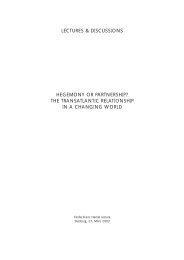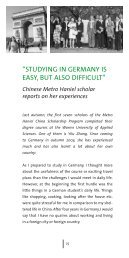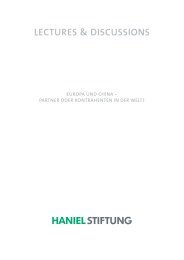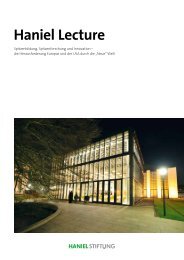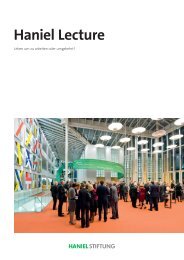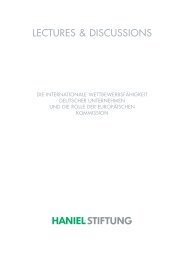Haniel Lecture 09 2010 E.pdf - Haniel Stiftung
Haniel Lecture 09 2010 E.pdf - Haniel Stiftung
Haniel Lecture 09 2010 E.pdf - Haniel Stiftung
Create successful ePaper yourself
Turn your PDF publications into a flip-book with our unique Google optimized e-Paper software.
14 | Ronald Heifetz<br />
Consequently, we also need confi dants. We need people who<br />
don’t actually care about our professional agenda. They really care<br />
mostly about us. And therefore, they can help us recalibrate what<br />
we are doing. They can be a place where we can put everything<br />
in our hearts on the table, without it being organized, without it<br />
sounding reasonable, where we can be as irrational as sometimes<br />
we feel, because there are days like that. (There is an old song from<br />
my era growing up in California “Mama said there will be days like<br />
that”.) And there are days like that. And so we need confi dants;<br />
usually, they are outside of the organization. They are friends, they<br />
are family, or they may be old colleagues with whom we no longer<br />
have any kind of competing set of interests, people with whom we<br />
can then talk freely.<br />
The third idea, distinguishing role and self, is a very important one,<br />
and this is actually a very big idea. I spend two weeks every January<br />
giving an intensive course for people at mid-career at Harvard<br />
Kennedy School on this one idea – the importance of distinguishing<br />
one’s role from oneself. We tend to confuse our professional<br />
roles with who we are as human beings, and because of that confusion,<br />
our own self-esteem ends up being hostage to the vicissitudes<br />
of the professional roles that we inhabit. If all of a sudden<br />
something happens in the United States’ stock market and, even<br />
though you are 4,000 miles away, things go quickly downhill in<br />
the midst of a crisis, it is pretty important to remember that the<br />
import of this event is not personal. This awareness is diffi cult to<br />
maintain because the impact of the event feels personal, and even<br />
more so when you are the authority fi gure, the person in charge,<br />
because all eyes look to you to resolve the problem. Very quickly<br />
for most of you who have grown up identifying yourself as the<br />
go-to person, as the responsible problem-solving person, you can<br />
begin to take people’s problems off their shoulders and take personally<br />
their pains, losses and fears. It is indeed your job to provide<br />
leadership to manage the transitional and adaptive change<br />
demanded by the crisis, and to manage their fears and pains, but<br />
you also have to manage your own. Sometimes, people take personally<br />
the anger that is directed toward them from frustrated<br />
employees, colleagues, and constituents, and then allow themselves<br />
to be burdened in an unhealthy way, unhealthy personally<br />
and unhealthy professionally.<br />
Partners, allies and confi dants, can help you distinguish your role<br />
from yourself. I’ve had the pleasure of lunch on two occasions<br />
with King Abdullah of Jordan, a very talented man. After one of<br />
those lunches, there was an open forum at our school and a South<br />
Ameri can student asked the King a question, “Where we live we<br />
don’t have kings. So I am dying to know, what is it like to be a<br />
king?” And King Abdullah was gracious and wonderfully honest.<br />
He said, I did not expect to be the king. My uncle was supposed<br />
to be the king, but before my father died, King Hussein decided<br />
I should be the king. Well, perhaps my father was preparing me<br />
because he said to me repeatedly while raising me: My son, the<br />
moment you begin to believe that you are a king, you are in trouble.”<br />
King Hussein became king when he was a teenage boy.<br />
“We tend to confuse our professional roles with who we are as human<br />
beings, and because of that confusion, our own self-esteem ends up being<br />
hostage to the vicissitudes of the professional roles that we inhabit.”<br />
He had been king nearly his whole life, but he knew that when<br />
people kissed his hand, they were not kissing him, they were kissing<br />
king. And at the other extreme, when people were shooting<br />
bullets at him, they were not actually shooting at him; they were<br />
shooting at the king.<br />
I have had the opportunity on many occasions to sit with Dalia<br />
Rabin, Yitzhak Rabin’s daughter, a wonderful person and fi ne politician<br />
in her own right. However painful, she understands that her<br />
father’s assassination was not personal. Of course, in a way it was<br />
the most profoundly personal act, to kill her father, but in another<br />
way it was not personal at all. The man who killed Yitzhak Rabin<br />
wanted to silence a decisive and powerful voice that promoted<br />
seemingly intolerable losses, a perspective that challenged the<br />
loyalties many Israeli settlers were carrying from their ancestors<br />
of 2,000 years – loyalty to the love of people who gave them the<br />
belief that they should live on those ancient stones. So, one stays<br />
alive in leading by using partners to help you distinguish your role<br />
from yourself. I fi rst learned this as a father. When I started having<br />
children, one of my close friends said to me, “You will really know<br />
you have succeeded as a father when your child is disrespectful<br />
and you don’t take it personally … and it will take you two children<br />
to fi gure it out!” And that is so true. I have two children, now studying<br />
in the university, a boy and a girl.



